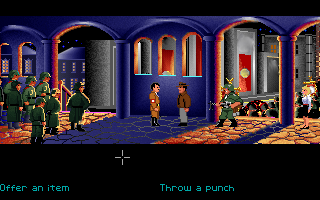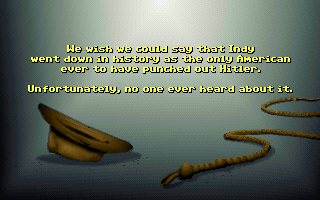Video Games and the Ability to say ‘No’
Imagine Philip Marlowe turning down the job from General Sternwood at the beginning of The Big Sleep. Or Bilbo Baggins standing his ground and not join Thorin Oakenshield's company in The Hobbit. Or if Han Solo refused to take Luke and Obi-Wan in Star Wars.
There wouldn't be a story. Books and Movies work because they have characters make choices that put them or others in situations which advance the plot. Books and Movies are also passive mediums where the audience can only follow along with the road that's already set out for them.
Video Games on the other hand are interactive mediums. While one can argue that the audience is still just following along a predetermined road with only a few forks to choose from -- basically, Choose-your-own-adventure-Books with graphics -- there is still a far greater amount of customizability and choice possible.
Unfortunately, most video games don't include an option to just say 'No' to something that happens in-game.
For example, in the begining of Moebius: Empire Rising, the main character gets an offer from a client. The dialogue seems to allow me to just tell them 'No'. But then, nothing else happens. I can go back to the starting location, but there is nothing else there to do. There is no consequence, and worse, there is no driving force to make me change my mind.
There is simply no explanation why I have to say 'Yes' to the client.
Similarly, Indiana Jones and the Last Crusade doesn't include an option to turn down Donovan's offer at the beginning, but there is a good reason for that: Indy's father has gone missing on the very same mission. This at least gives me a strong reason to go along with it.
Saying 'No' doesn't have to lead to a satisfactory ending. In the same Indiana Jones game, we get to meet Hitler in Berlin:

Notice the option that says 'Throw a punch'? I believe most games nowadays wouldn't have it, they might even make the whole thing a cutscene. Why? Because doing so has the guard in the back kill you, leading to a game over screen.

And that's fine. Not every choice a player can make is required to lead to a happy ending in the story. Ending the story prematurely due to the decisions of the player is a valid option. But boy, did it feel good to select that 'Throw a punch' option.
In Shadowrun Returns: Dragonfall (the excellent DLC campaign), the game starts with a friend being killed and the player taking over her old team. There is no choice here, no way to just say 'Boy, shadowrunning is to dangerous, I'm out!' That may be okay because once again, a clear motive is given.
But as you stand before the Final Boss, you hear about the Evil Plan. And I thought 'Hey, that's kinda good actually, I no longer want to stop you'. Except that wasn't an option. Of course, immediately after I heard about The Price To Pay, and I thought 'Whoa, that's a bit steep.' But again, no option to just say 'Sure, I'm in!' I wouldn't have expected a successful outcome - maybe my team would turn against me, or maybe the Final Boss would've killed me because there are no partners in this project.
Either option would've been fine and one can argue that there is a choice in case I had made a different choice earlier. (It's hard to write these postings while avoiding spoilers, so the only thing I can say is that the second-to-last mission is the one with the real choice).
It's hard to get this right. Not having meaningful choices is often worse than not having choices at all because in the first case, as a player I immediately see all the unrealized potential while in the second case it may be easier to string me along, unless it's too obvious. I think the second is nowadays called Cinematic Experience because strictly linear gameplay has a negative connotation to it.
More modern games often use a morality system - Renegade/Paragon in Mass Effect, Dark/Light side of the Force in Knights of the Old Republic, even the alignment in many Dungeons & Dragons games. Very often though, these systems are much too confined, to absolute, literally too black/white. The dark path is often the psychotic mass murderer, while the light path ends up with a character that's holier than Mother Teresa. Try to play a mafia boss who has no qualms nuking an entire city but donates a lot of his money to his local orphanage because he loves children and likes kittens. This post on Dorkly describes some of the issues better.
But even with a morality system, there is often no way to just say 'No', often it's just the choice between saying 'Yes' through diplomacy (light) or force (dark).
The Fallout series made a more concious effort to have choice in the game - the epilogues reflect upon the choices, letting us know what happened to the peopel we've interacted with. Mass Effect 3's ending - as insulting as it was - also did get that part right.
But again, these games didn't offer the option to say 'You know what? Screw you all, I'll retire to the countryside and become a farmer!'
Choices add cost - it's the dilemma of creating content that a single player may never see. Yes, all the content in the game will be seen by the playerbase as a whole, but often not by a single person. So why spend money on 'optional' content when a more linear, cinematic experience offers more bang for the buck?
Because it's boring to me. Video Game characters are flat and boring compared to movie and book characters - there is no Michael Corleone, no Keyser Soze, no Vivian Sternwood in gaming. Sure, there are a lot of memorable characters and moments, but even the more memorable ones only reach Jack Bauer level at best. They are puppets, not driven by choice but driven by an external force that's often too intrusive to the story.
Giving the player the option to say 'No', to walk away from things their character doesn't want to do helps fleshing out the character, making more use of the interactive medium. Sure, punish me for it, give me an early game over screen because I didn't stop the Final Boss. But leave that decision up to me. Maybe I just flee, not caring if the Final Boss destroys my planet. Maybe that drives me insane and my character commits suicide a few years later. That's fine, because it was the result of a choice that I made as a player, not a choice that I was predetermined to do.
Quantic Dream did great efforts here with Fahrenheit/Indigo Prophecy and especially with Heavy Rain, games in which my character had a good reason to start the quest but offered me freedom to choose how to go on from there, with the consequences of my actions shown to me. It's not perfect, but Heavy Rain is possibly one of the best positive examples.
People are creative. Look at all the 'Fan Fiction' written for The Sims, a game devoid of much inherent story and entirely choice-driven. Some things eventually become part of the game lore (the tragic accident of a family involving a pool with no ladder in The Sims 3), but what's more important, as a player I have a feeling that I'm part of an interactive medium. I'm basically playing with dolls, making up my own story as I go along.
There has to be a better way to merge the Story-less/Choice-driven nature of The Sims with the Story-heavy/Choice-less nature of most other games. I'm looking at the Indie-developer scene here, the people that gave us Papers, please, Fez, or the before-mentioned Shadowrun Returns (which arguably benefitted from the rich source material). I feel that if such a game will exist, it will come from an Indie studio.
Help us, Indie-wan Kenobi, you are our only hope for a Keyser Soze or Vivian Sternwood.